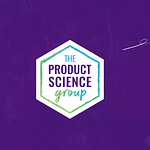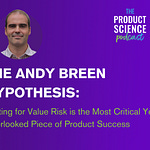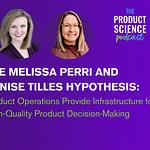What happens when the product science principles are applied to a conference organization? You get Product Collective, now called Mind The Product by Pendo.io. Through events like INDUSTRY: The Product Conference, along with resources such as a member hub and over 100 hours of past conference videos, product professionals across the globe find community, learn, and improve their work.
Rather than AI being the end-all-be-all answer, Mike hopes that AI will be used to integrate both qualitative insights from empathetic customer interactions and quantitative data. This evidence-based approach involves testing strategies through small experiments, learning from the outcomes, and aligning decisions with core values and customer outcomes for incremental growth.
Mike also reveals insights from his experience working with Bob Moesta on jobs-to-be-done interviews, highlighting the value of going deep in customer research to uncover valuable insights, and in his case, understand attendees’ needs and improve the conference and/or community experience.
Takeaways include asking deeper questions, spending more time gathering that qualitative feedback so that you can go deeper, being curiously observant of jobs-to-be-done, and finding various modalities in which to gather continuous feedback from the “friendlies” and those who are more hesitant to capture a complete picture.
Resources
Follow Mike Belsito on LinkedIn
Explore the free resources and upcoming events at mindtheproduct.com
Listen to Mike on Rocketship.fm
Visit the Product Science Group website
Explore Product Science Workshops and Courses
Quotes from Mike Belsito
(00:06:52) "The job that people hire your product for, you know, if you want to think of it, in jobs to be done context, it may not be what you think it is." - Mike Belsito
(00:21:29) "Qualitative data is data. So being data driven doesn't mean that we're relying only on the reports and the analytics. It's not an either or. It's not quantitative versus qualitative. It's using them both together." - Mike Belsito
(00:28:15) "It's not just what you've learned, but it's these relationships that are a real value to you." - Mike Belsito
Lab Notes
Lab Note 607.1: Depth is where you find Differentiation.
(00:32:54) “...when you do any type of research, finding out what words mean and getting deeper is, I think, very key to finding that differentiation. So something I like to say is verbs are questions and adjectives are questions, right? Whenever someone says, you know, I'm going to I need to be online, well, what does that mean?” - Adam Thomas
Lab Note 607.2: Start with observation of the jobs-to-be-done.
(00:33:59) “Folks have an ideal way of doing their work, and then they have an actual way. One boondoggle. One place where you'll get trapped with jobs to be done is to start thinking about the ideal way that folks like to do jobs instead of thinking about what is actually happening.” - Adam Thomas
Lab Note 607.3: Use different modalities to get feedback from a range of people.
(00:38:11) “... in the context of a product getting continuous feedback, Is it a user interview? Is it a survey? And the importance of reaching people beyond just those friendlies, the ones who are eager to share their feedback and to go beyond the power users ...finding a way to reach them and hear their voices and include their thoughts in the product development process.” - Dina Levitan










